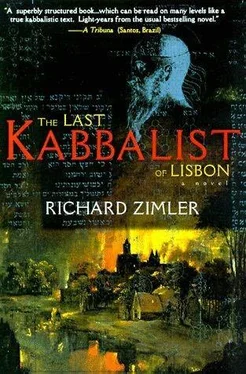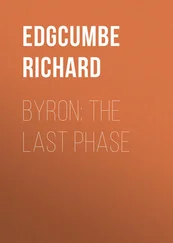Richard Zimler - The Last Kabbalist of Lisbon
Здесь есть возможность читать онлайн «Richard Zimler - The Last Kabbalist of Lisbon» весь текст электронной книги совершенно бесплатно (целиком полную версию без сокращений). В некоторых случаях можно слушать аудио, скачать через торрент в формате fb2 и присутствует краткое содержание. Год выпуска: 1998, Издательство: Arcadia Books, Жанр: roman, Исторический детектив, Философия, на английском языке. Описание произведения, (предисловие) а так же отзывы посетителей доступны на портале библиотеки ЛибКат.
- Название:The Last Kabbalist of Lisbon
- Автор:
- Издательство:Arcadia Books
- Жанр:
- Год:1998
- ISBN:нет данных
- Рейтинг книги:5 / 5. Голосов: 1
-
Избранное:Добавить в избранное
- Отзывы:
-
Ваша оценка:
- 100
- 1
- 2
- 3
- 4
- 5
The Last Kabbalist of Lisbon: краткое содержание, описание и аннотация
Предлагаем к чтению аннотацию, описание, краткое содержание или предисловие (зависит от того, что написал сам автор книги «The Last Kabbalist of Lisbon»). Если вы не нашли необходимую информацию о книге — напишите в комментариях, мы постараемся отыскать её.
The Last Kabbalist of Lisbon — читать онлайн бесплатно полную книгу (весь текст) целиком
Ниже представлен текст книги, разбитый по страницам. Система сохранения места последней прочитанной страницы, позволяет с удобством читать онлайн бесплатно книгу «The Last Kabbalist of Lisbon», без необходимости каждый раз заново искать на чём Вы остановились. Поставьте закладку, и сможете в любой момент перейти на страницу, на которой закончили чтение.
Интервал:
Закладка:
Does charring Old Christian flesh smell any different than that of a Jew? I admit that I could tell no difference. “Ah, but if you’d been at the Rossio…” more than one New Christian told me with a caustic smile on his face.
As for the ecclesiastics of the São Domingos Church and Convent, King Manuel ordered the good friars dispersed throughout his kingdom at the end of May. Have no fear for their broken hearts and nostalgic members, however; they were back in their mistresses’ arms in Lisbon by the end of October thanks to the intercession of Pope Julius II, may his name and its shadow be erased as well. Except for two of their number, I should add. Frei João Moucho and Frei Bernáldez, the two men who exhorted the rabble to mass murder that fateful afternoon before the São Domingos Church. Arrested and taken to Evora, they languished there for a time in the municipal dungeon. In October, when few people remembered anymore what they’d done, they were garroted and turned to ash.
It finally rained again on May the ninth.
But little of this do I remember. The first of March, fifteen and seven, is the only date that takes on hard edges for me. (Yes, for a time I learned to think within the Nazarene calendar. I take it as a symptom of my madness. May I forever cast out the Christian from within me!)
That morning, little Didi Molcho pulled me from our store as if toward treasure. “Run!” he shouted. We raced toward the voice of a crier on the steps of the São Miguel Church. He was reading a vellum decree from King Manuel: “Henceforth, New Christians will be allowed to leave my kingdom, and there shall be no…”
Hope for another landscape pulled my head into the sun. I breathed into swelling lungs for the first time since the death of Diego.
A barber shaved my beard while his daughter de-loused me. In her tiny hands, her comb digging my scalp, I began to consider for the first time how I’d paid for Diego’s murder. Should I have felt the claws of sin in my chest? I didn’t. And I don’t now. Maybe that makes me a man bereft of a higher soul. I don’t care. I look not in mirrors, and something in my face seems to elicit discretion from kabbalists who might be able to see a terrible absence in my aura.
And yet, another sin I committed long ago does sometimes trouble me—even penetrates my prayers. That young nobleman whom I pushed from a roof in the Moorish Quarter. Did he survive? I doubt it. Occasionally, in dream, I see him staring up at me from the bottom of a putrid well.
Mother and I gave all of Uncle’s books to Dona Meneses. She got away with her murder of Simon, of course. Not only was I not in any position to cast stones at her, but I knew that any accusations I made would have dire consequences for me and my family. Guarded by her retinue of blond Flemings, she continued to live her charmed Old Christian life above her marble balcony in the Graça. From what I hear, she died four years ago, in the spring of fifteen twenty-six, of an infection caused by an idiot bleeder with slippery fingers.
After seeing my uncle in a dream, Father Carlos also asked Dona Meneses to smuggle to safety his part-Hebrew, part-Arabic copy of Solomon Ibn Gabirol’s Mekor Hayim , the Fountain of Life. As far as I know, it is now in Salonika.
Will any of our books survive the centuries, or will Uncle’s fight have been in vain?
With all the New Christians leaving Portugal, houses could only fetch a fraction of their real value. Rather than sell for a pittance, we offered our home to Brites, our laundress; she lived in a slum beyond St. Catharine’s Gate that wasn’t fit for a person of her spiritual grace.
She stamped her feet when we told her and said, “I can’t accept it!”
“You must,” Aunt Esther insisted.
“No!”
“Then on loan,” I suggested. “If Reza ever wants it back, she’ll come for it.”
Tears gushed in her eyes. The deal was sealed with hugs. She ended up spending the rest of her life there.
A few weeks later, just before leaving Portugal, while on a delivery of fruit to a store in the Bairro Alto, I spotted the boy in my drawing who had tried to sell Senhora Tamara my uncle’s Haggadah. He had a naturally kind face, closely cropped black hair. “What’s your name?” I asked him.
“Diego,” he replied.
I whispered, “My Jewish name is Berekiah Zarco. I need to know what they call you in the holy language.”
“Isaac Belmira Gonçalves,” he said.
“A man named Diego Gonçalves adopted you, didn’t he?”
His eyes opened wide with surprise. “Yes. How did you know?”
“I knew him well.”
In a local inn, over steaming cinnamon bread and wine diluted with water, we talked of his adoptive father’s love of birds and ancient manuscripts. The boy lived with Senhora Belmira’s sister. He was shy, but a quick passion trembled his lips when he spoke of battle. He was going to be a crusader. I will never understand how it is that the young are so eager to die. Before we parted, I kissed his forehead and blessed him silently.
Rabbi Losa, the willing convert and enemy of my Uncle’s, still lives in his house just below the São Miguel Church. He bowed and groveled his way into the Bishop of Lisbon’s heart and has even become one of his advisors in ecclesiastic law. Both his daughters are grown and married, living together in Santarém, I’m told.
Father Carlos decided to stay in Portugal as well. “May God make me either a good Christian or a better actor,” he said when I last saw him, twenty-three years ago. His words reminded me, of course, of Zerubbabel, Isaac of Ronda, the Count of Almira. I have heard nothing of his fate. Maybe his real name was something else entirely. Maybe he wasn’t even Castilian or New Christian. Perhaps Joanna wasn’t even his daughter.
Of course, I have heard nothing from her. Yet, on occasion, even today, she still descends into my dreams. The bitterness is gone from her lips, however, and I ceased forcing comparisons with my wife years ago. Even a Torah memory melts with tears.
Neither have I had news from Helena, the girl to whom I was betrothed so many years ago and with whom I lost my virginity. It is better that way.
In May of fifteen and seven, as we were making plans for departure, a merchant in scarlet and white robes came to our house with a letter from the New Christian beggar, António Escaravelho. Just after the riot against us, long before King Manuel’s decree allowed New Christians to leave Portugal, he was able to secure his exit permit to visit his beloved Pope Julius.
“Do you know if he’s doing well in Rome?” I asked the courier.
“Rome, what are you talking about?! He’s in Jerusalem. Already got himself a silversmith shop in the old Jewish Quarter.”
I ripped open the letter’s wax seal: “Dearest Berekiah, I told you and Master Abraham that you should plan to come with me. This old donkey wasn’t so crazy after all, was he? Fuck Pope Julius. I spit on the whole Italian peninsula. May a plague of venomous serpents descend on Rome and bite all its Christian residents in their fat asses. You will always be welcome with me. Next year in Jerusalem.”
Not next year, but perhaps soon. After all, we have moved closer. And I’m not getting any younger. If I’m ever going to go…
In July of fifteen and seven, Farid took a boat to Constantinople, carrying the address of Tu Bisvat and what money we could spare. Mother, Cinfa, Esther, Afonso Verdinho and I followed him in August, our ship setting sail from Belem on the nineteenth of Av. To our surprise, a ramshackle two-story house in the small Jewish quarter was waiting for us; with help from Tu Bisvat, whose true name I am not at liberty to mention, Uncle had been able to make a small down payment on some property.
Читать дальшеИнтервал:
Закладка:
Похожие книги на «The Last Kabbalist of Lisbon»
Представляем Вашему вниманию похожие книги на «The Last Kabbalist of Lisbon» списком для выбора. Мы отобрали схожую по названию и смыслу литературу в надежде предоставить читателям больше вариантов отыскать новые, интересные, ещё непрочитанные произведения.
Обсуждение, отзывы о книге «The Last Kabbalist of Lisbon» и просто собственные мнения читателей. Оставьте ваши комментарии, напишите, что Вы думаете о произведении, его смысле или главных героях. Укажите что конкретно понравилось, а что нет, и почему Вы так считаете.












